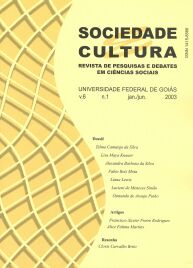Sobre o compromisso do antropólogo e seu papel de mediador cultural
DOI:
https://doi.org/10.5216/sec.v6i1.619Abstract
Seguindo a linha de uma análise crítica sobre os fundamentos do fazer antropológico, ou seja, da concepção da disciplina, do modo como lidar com seu objeto e dos métodos adotados para tal, no presente texto coloco em discussão o lugar-comum, estabelecido ao longo do tempo, segundo o qual os antropólogos têm um compromisso para com os grupos com os quais trabalha. Para isto, lanço mão fundamentalmente do caso dos Guarani do estado de Mato Grosso do Sul, onde os intensos conflitos fundiários entre estes e não-índios impelem o antropólogo a ser mais do que meramente um pesquisador, portando-se como um mediador, nos vários sentidos que as demandas se lhe impõem, até mesmo sob pena de ver fracassados seus projetos de pesquisa. Palavras-chave: antropologia crítica, compromisso do antropólogo, mediação cultural, índios Guarani.Downloads
Download data is not yet available.
Downloads
Published
2007-12-05
How to Cite
DA SILVA, ALEXANDRA BARBOSA. Sobre o compromisso do antropólogo e seu papel de mediador cultural. Sociedade e Cultura, Goiânia, v. 6, n. 1, 2007. DOI: 10.5216/sec.v6i1.619. Disponível em: https://revistas.ufg.br/fcs/article/view/619. Acesso em: 14 feb. 2026.
Issue
Section
Thematic Dossier
License
Authors who publish in this journal agree to the following terms:
- Authors retain the copyright and grant the journal the right of first publication, the work being simultaneously licensed under the Creative Commons Attribution License, which allows the sharing of the work with acknowledgment of authorship and of the initial publication in this journal;
- Authors are authorized to enter into additional contracts separately, for non-exclusive distribution of the version of the work published in this journal (eg, publishing in an institutional repository or as a book chapter), with acknowledgment of authorship and of the initial publication in this journal;
- Authors are allowed and encouraged to post and distribute their work online (eg, in institutional repositories or on their personal page) at any point before or during the editorial process, as this can bring productive change as well as increases the impact and the citation of the published work (see O Efeito do Acesso Livre).



